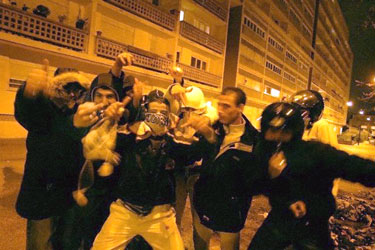Wabash College regularly has students studying all over the world. During most fall semesters 40 Wabash men will be abroad with 20 overseas in the spring. Just one student is in riot-torn France this semester, but more will be headed there next semester and next year.
France has been plagued with violence for two weeks in more than 220 towns. The unrest has come from the poor and large neighborhoods of African and Arab communities. Those communities have complained for decades about discrimination and unemployment.
Nearly 5,000 cars have been burned since the rioting began Oct. 27. A police accidental electrocution of two teenagers in a Paris suburb set off the widespread rioting.
 "Certainly there have been problems for a long time," Assistant Professor of French Veronique Zara said. "I think there was a lot of optimism about the French dream in the 50s and 60s, but it just hasn’t turned out the way a lot of people hoped. I think the first generation immigrants really were working hard toward integration but their children are a bit disillusioned."
"Certainly there have been problems for a long time," Assistant Professor of French Veronique Zara said. "I think there was a lot of optimism about the French dream in the 50s and 60s, but it just hasn’t turned out the way a lot of people hoped. I think the first generation immigrants really were working hard toward integration but their children are a bit disillusioned."
Much of the African immigration came after Algeria’s independence from France in the 1950s. France, with 5 million Muslims, has the largest Islamic population in Western Europe.
"I think there are parallels to the Rodney King episode," Zara said. "In both cases it was sparked by the police. The police have a very tense relationship with the (immigrant) population rejecting their authority. And, the police then feel the need to crack down on whatever is going on.
"Usually the lid is on the pot, but this time the lid got off."
Keith Clayton ’07 is studying in Strasbourg. He communicated earlier this week with Language Department secretary Sharon Metcalf.
"I am not in any danger," he wrote. "I have not seen any marching raids or anything except on television. I’m actually in the middle of writing a paper on the subject of the riots, their cause, and how they could have been predicted."
Clayton, who is African-American, wrote that he has a different perspective on the riots than other visitors because of his studies, personality and the fact he’s a minority.
Helene Huet, a French language intern, brings a college-age perspective to campus as well. Huet is from Lille in the northern-most area of France near the Belgium border.
Huet, who attends University of Lille, was surprised to find out the rioting had reached her city. "I was shocked because it’s where we go. I was really stressed and told my mother ‘Please don’t go there too late because we don’t know what might happen.’ "
Huet explained her family lives south of the city and must pass through the Arab/Muslim neighborhood to get into Lille.
"I had friends who are from Algeria and they were normal people you could talk to, but there are always groups of young people who want to insult you. Sometimes we see a group of people coming in from the suburbs and yes, we are afraid of them. Perhaps it’s just a stereotype."
But Huet understands the minority’s frustration.
"When I see those buildings and how degraded they are, it’s inhumane because they have nowhere else to live. If they had the money they could do some thing and could have better housing.
"There is prejudice. As for employment, if your name is Mohammad and then you’ve got a Vincent – Mohammad has no chance even if he has better qualifications."
Both women say Wabash men going to study in France should not be hesitant because of the recent problems.
"I would tell him he should think about it in the same terms if he were here," Zara said of the advice she would offer a Wabash student. "If he was going to New York City, maybe in certain parts of New York City, you should keep an eye out. You want to know where you are and what your surroundings are and so on. Other than that, I wouldn’t necessarily change anything."